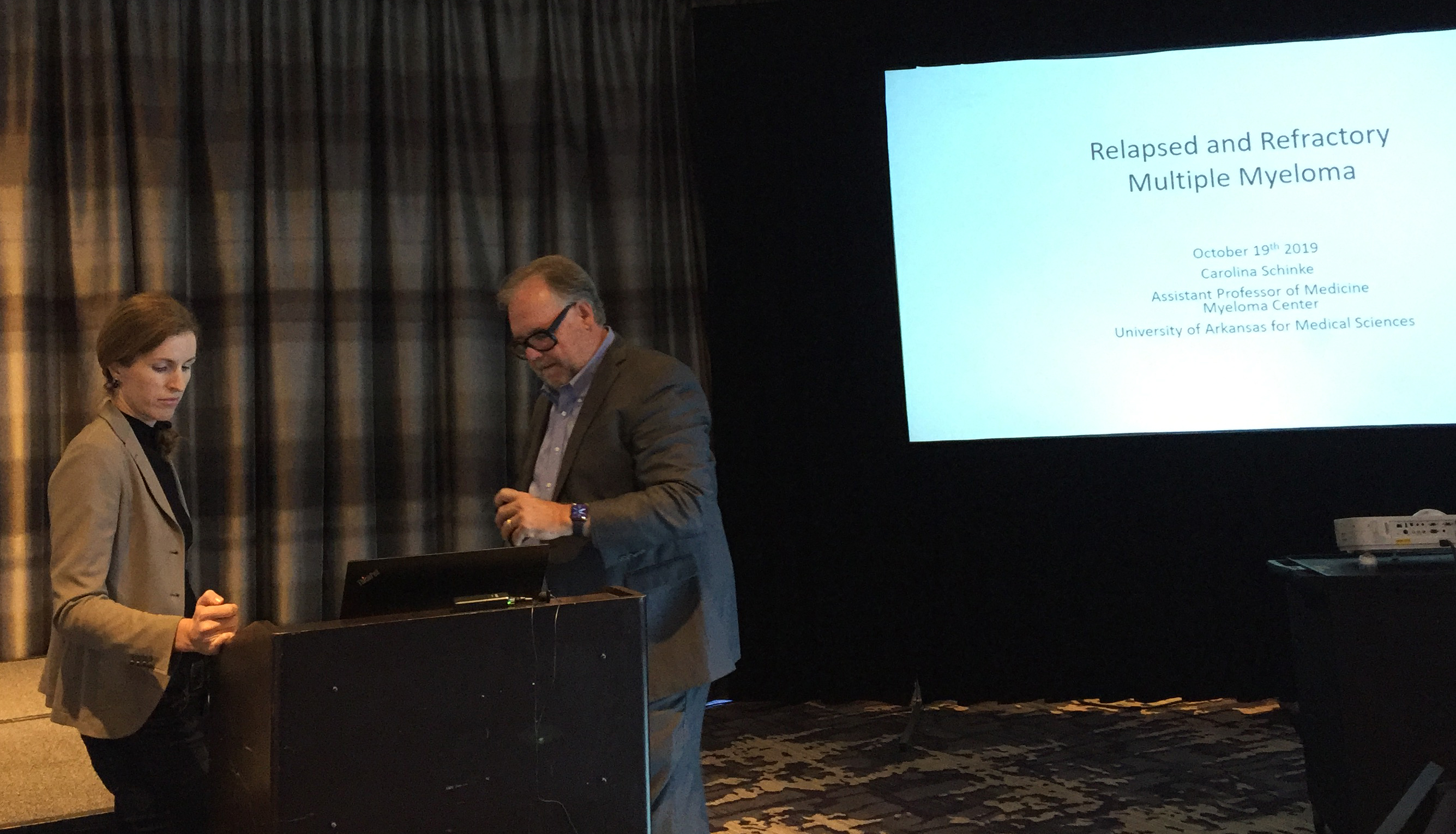International Myeloma Foundation Partners with UAMS for Regional Workshop
| UAMS Myeloma Center patients, caregivers and staff from across Arkansas and surrounding states spent a recent Saturday learning more about myeloma, a rare blood disease, and how to live successfully with it.
“Knowledge truly is power,” said Kelly Cox, of the International Myeloma Foundation (IMF), in welcoming the crowd of nearly 60 attendees to the Regional Community Workshop hosted by the foundation Oct. 19 at the Little Rock Marriott.
The IMF, founded in 1990, is the first and largest foundation focusing solely on multiple myeloma. The foundation includes more than 525,000 members in 140 countries. In addition to improving quality of life for myeloma patients, the foundation focuses on prevention and a cure by emphasizing research, advocacy, support and education.
“This meeting was a wonderful opportunity for the International Myeloma Foundation and the UAMS Myeloma Center to partner together with one thing in mind, supporting the patients,” Cox said after the conference.
The workshop included six sessions by four of the center’s physicians and social work manager and an IMF representative.
“A lot of good information was shared today,” said patient Buddy Kinamon of Hot Springs Village. “This was an unprecedented opportunity to hear and interact with the leaders in the field of myeloma. It helps develop a sense of hope for successful treatment.”
Guido Tricot, M.D., Ph.D., who recently returned to the Myeloma Center after retiring from the University of Iowa Health Care, spoke on upfront treatment. He said using a patient’s own stem cells for transplant remains the cornerstone for successful therapy and that two transplants in close succession along with consolidation therapy with triple therapy for at least two years is key to prolonged remission.
Maurizio Zangari, M.D., director of bone disease research at the Myeloma Center, discussed the disease’s impact on bones and that the presence of more than three large focal lesions is associated with a poor outcome in newly diagnosed patients.
Carolina Schinke, M.D., spoke about myeloma relapse and failure to respond to treatment.
“Up until the early 1990s we really had nothing for myeloma besides the chemotherapy drug melphalan, but today we have a lot of new treatments to keep myeloma at bay,” Schinke said. She added that a new form of immune cell therapy, chimeric antigen receptor T (CAR T)-cell therapy, which stimulates the immune system to fight cancer cells, holds bright promise for the future. Treatment for myeloma patients is expected to begin at the Myeloma Center next year.
Frits van Rhee, M.D., Ph.D., clinical director of the Myeloma Center, spoke about maintenance, clinical trials and the progress made in treating myeloma.
“I think the results we have seen are very good and I think we have seen cures,” van Rhee said, noting that at least three long-term patients were in the audience.
Harold Dean, social work manager, spoke on the emotional aspect of myeloma and treatment of the disease.
“When a patient is diagnosed, they worry about all aspects of their life from survival to work, income and family,” Dean said, noting the support that his department offers such as educational classes, support groups and counseling.
“Many of us in our lives have helped others and sometimes we need to be the recipients of help,” Dean said.
Kevin Brigle, Ph. D., a nurse practitioner with the Massey Cancer Center of Virginia Commonwealth University in Richmond, Virginia, serves on the IMF’s nurse leadership board. He reminded patients they have a lot of people supporting them.
“It’s not just you in this fight,” he said. “It’s your oncologist, your family, your friends; it’s an entire team.”
